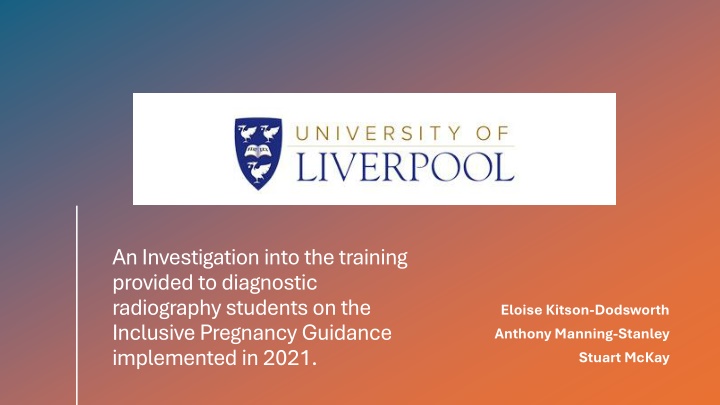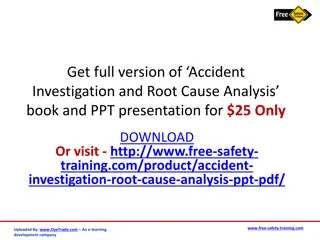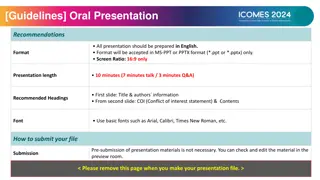
Investigation into Diagnostic Radiography Students' Training on Inclusive Pregnancy Guidance
This investigation aims to assess the training provided to diagnostic radiography students regarding inclusive pregnancy checks, focusing on the implementation of Inclusive Pregnancy Guidance in 2021. The study explores the importance of inclusive communication in healthcare for the sexual and gender minority community. Methodology involves using a survey tool to evaluate students' confidence levels and knowledge on the subject. Results indicate a significant percentage of students feeling confident in conducting inclusive pregnancy checks.
Download Presentation

Please find below an Image/Link to download the presentation.
The content on the website is provided AS IS for your information and personal use only. It may not be sold, licensed, or shared on other websites without obtaining consent from the author. If you encounter any issues during the download, it is possible that the publisher has removed the file from their server.
You are allowed to download the files provided on this website for personal or commercial use, subject to the condition that they are used lawfully. All files are the property of their respective owners.
The content on the website is provided AS IS for your information and personal use only. It may not be sold, licensed, or shared on other websites without obtaining consent from the author.
E N D
Presentation Transcript
An Investigation into the training provided to diagnostic radiography students on the Inclusive Pregnancy Guidance implemented in 2021. Eloise Kitson-Dodsworth Anthony Manning-Stanley Stuart McKay
Conflict of Interest and Disclosure Nothing to disclose - No relevant financial relationships exist
Introduction and Background Study Aim: To identify whether sufficient training is being provided to diagnostic radiography students to allow them to perform inclusive pregnancy checks (IPS). Study Background: Limited access to gender-affirming care contributes to mortality rates and health inequalities amongst the sexual and gender minority (SGM) community due to a fear of stigmatisation and a lack of awareness from practitioners. The SOR inclusive guidance stresses the importance of inclusive communication, and the correct use of SGM associated terminology within practice to cultivate the behaviours necessary for affirming SGM healthcare. After a search of several databases, no research was discovered on how undergraduate diagnostic radiography students are trained for inclusive interactions despite the value of undergraduate education in shaping students practices and attitudes
Methodology Survey Tool and Ethical Considerations The study utilised the JISC online survey tool to assess the training and confidence levels of diagnostic radiography students regarding the SOR IPS guidance The use of the survey tool enabled efficient distribution and collected broad research across all five cohorts at the University of Liverpool Ethical approval was obtained from the universities Research and Ethics Committee for both the pilot and final study All responses were anonymised and participants were required to provide informed consent
Methodology Pilot Study and Questionnaire Design A pilot study was conducted with recent graduates, leading to refinements in the final questionnaire The final survey gathered demographic data and assessed students knowledge and confidence in pregnancy screening and inclusive practice Participants also provided feedback on their training experiences both in university and whilst on clinical placements
Results Understanding and Implementation of IPS Guidance Response Rate 28.9% of the MSc cohorts responded 35.5% of the BSc cohorts responded Thorough Understanding and Confidence 86.5% felt confident or very confident conducting IPS checks on female patients 78.4% conducted IPS checks on all genders in line with SOR guidance Responsibility and Reasoning Participants were aware of their responsibility for pregnancy checks to ensure fetus is not exposed to ionising radiation unless necessary, consistent with IR(ME)R regulations
Challenges in Inclusivity and Consistency in IPS checks Results Inconsistencies in Screening Practices 23.3% of participants would only screen female patients of childbearing age Only 39.2% felt confident or very confident conducting IPS checks on male patients Gaps in Confidence and Experience 43.2% of participants felt unconfident or very unconfident conducting IPS checks on patients under 18 Discrepancies in training and experience impacted confidence levels
Results Training and Educational Needs for Inclusive Care Gaps in Training Only 41.9% received IPS training from the university The majority of participants confidence was built from clinical experience (64.9%) versus university education (5.4%) Calls for Improved Education 67.7% of students called for more education on inclusivity Specific needs: inclusive terminology, communication with LGBTQ+ community, small group tutorials Importance of early tutorials before clinical placements for awareness of inclusive practices
Conclusion This project highlighted gaps in IPS training and although students have received guidance on pregnancy screening and radiation protection, they have not been prepared to consistently implement gender-affirming care to the LGBTQ+ community Limitations The response rate for master s students at the university was particularly low (28.9%) meaning a representative view from the pre-registration masters course could not be obtained This study was only distributed to students at one university Participants were not asked what NHS trust they currently attend Potential Future Research Focus groups to explore points raised in open-ended questions Explore inconsistencies in pregnancy screening between staff members and NHS trusts
References 1. McDermott E, Nelson R, Weeks H. The Politics of LGBT+ Health Inequality: Conclusions from a UK Scoping Review. Int J Environ Res Public Health [Internet]. 2021 Jan 19 [cited 2023 Oct 01]; 18(2):826. Available from: https://www.ncbi.nlm.nih.gov/pmc/articles/PMC7835774/ 2. Careers BA, Travers J, Primiano JE, Luscombe RE, Dorsen C. Provider and LGBT Individuals' Perspectives on LGBT Issues in Long-Term Care: A Systematic Review. The Gerontologist [Internet]. 2020 April [cited 2023 Oct 01]; 60(3):169-183. Available from: https://doi.org/10.1093/geront/gnz012 3. The Society of Radiographers. Inclusive pregnancy status guidelines for ionising radiation [Internet]. London: Society of Radiographers; 2021 [cited 2023 Oct 06]. Available from: https://www.sor.org/learning-advice/professional-body-guidance-and-publications/documents- and-publications/policy-guidance-document-library/inclusive-pregnancy-status-guidelines-for-ionising 4. Department of Health and Social Care. Ionising Radiation (Medical Exposure) Regulations 2017: guidance [Internet]. London: GOV.UK; 2017 [cited 2023 Oct 05]. 37 p. Available from: https://www.gov.uk/government/publications/ionising-radiation-medical-exposure-regulations- 2017-guidance 5. Jisc. Online Surveys. [Internet]. 2023 [cited 2023 Dec 02]. Available from: https://www.onlinesurveys.ac.uk/






















